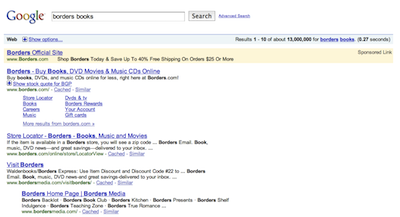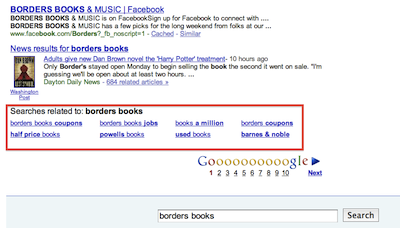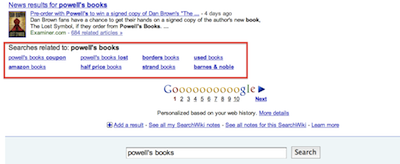Whats wrong with search engine marketing and what you can do about it
Let me begin by saying every brand should work on improving their natural search rankings. And many businesses can benefit from paid search, too. Remember that as you read the rest of this post.
But…
When you’re using search – or social, for that matter – a key question to ask yourself is: “Whose brand are you building?”
Take a look at this search result for the brand term “Borders Books”
That’s what you expect to see, right? Border’s Books ranks first naturally and for paid search. They’ve even got a nice list of search links from within the site to guide customers to exact information they’re looking for. Without getting into the “should you buy brand terms” debate, it looks like they’re doing a good job. But, wait. Scroll down to the bottom and here’s what you see:
Google also suggests alternate searches, including competing brands such as Barnes & Noble and Powell’s Books. I suspect the fine folks at Powell’s would be pleased, what with Google advertising them to Border’s Books customers for free.
Except that it isn’t free. When you look in these “Searches related…” for Powell’s Books, you get this:
Yep. Border’s is there. So is Barnes & Nobles. And Amazon and The Strand, too. Isn’t that helpful of Google, showing customers all the possible options available to them? Seriously. It’s helpful for customers, which is as it should be. But is it helping your brand?
And that’s the point: the brand you’re building with Google’s search results is Google. The same is true – more or less – when you ask a customer to follow you on Twitter, become a fan on Facebook or any of the other search and social options available to brand marketers. Which isn’t to say you shouldn’t use these tools. As noted above, both paid and natural search are great options for many companies. Social, too. Most companies need to consider them, if not use them outright. Just be conscious of whose brand it is you’re building.
What can you do to build your brand?
- Think “Hub and Spoke” – Each of these tools – paid search, natural search, social media, etc. – are spokes of a wheel that connect your customers to you. The hub? Your site. Make sure every profile, every search result, every link includes your contact information, a link to your site and so on. You want to distribute content across the web, let customers consume it where they are, hell, eventually let them buy where they are. But you also want to make sure you’ve got a strong hub to bring them back.
- Keep the scent strong – When a customer finds you on a search engine – or a social site – and clicks through to your site, they expect an answer to their question. Make sure you’ve done everything you need to keep them from bouncing away.
- Sell yourself as much as your product – Every interaction a customer has with your brand is an opportunity to grow your brand in your customer’s eyes. Forget about Google, are you helping your brand every time a customer talks to you? Or are you driving them away?
Paid search, natural search and social marketing will likely be around for a long time. And the sites that use them most effectively will succeed in gaining incremental sales, at least for a little while. But, more important, the companies that meet the needs of customers using these tools – no matter how those customers found your brand – are the ones that will build the strongest brands and the strongest businesses over the long run.
Are you getting enough value out of your small business website? Want to make sure your business makes the most of the local, mobile, social web? thinks helps you understand how to grow your business via the web, every day. Get more than just news. Get understanding. Add thinks to your feed reader today.
And while you’re at it, don’t forget to follow Tim on Twitter.
Technorati Tags:
adwords, bounce rate, continuous improvement, E-commerce, e-commerce, e-marketing, ecommerce, Google, google, google adwords, internet business, internet marketing, landing page design, landing page optimization, marketing, marketing best practices, online marketing, ppc, ppc marketing, search, search engine marketing, search engine optimization, sem, seo, social, social marketing, social media, social strategy, strategy, success, twitter
Comments (0)
Leave a Reply
You must be logged in to post a comment.




Palapple Blog | SEO Solutions for your Business…
Thanks for sharing. Search engine optimization is indeed one of the most crucial areas in Internet marketing, it is a perfect bridge between technology and business….
[…] OK. I don’t know that there are exactly 324 reasons why social media marketing is a Very Good Thing, but I’m confident there are lots (Actually, I think I see another post on how many there are in my future). Long-time readers, however, will note that I don’t talk about having a “web site.” I talk about having a “web presence.” […]